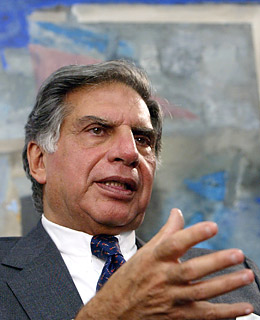
Since Ratan Tata first suggested building a car that could sell for 100,000 Indian rupees ($2,500) four years ago, rival automakers have sniggered. "If you think about the direction that safety and environmental standards are going in India, you can't sell a car for that kind of price," said Osamu Suzuki, head of the eponymous Japanese car company that is the Indian-market leader. But in January, Tata unveiled his baby car, a cute rear-engined bubble called Nano. The Nano will meet all of India's automotive standards and sell for 100,000 rupees.
"A promise," said Tata, "is a promise."
If the idea behind the Nano is to put a car within affordable reach of millions more Indians, Tata's other big auto play is focused on the few. In March, Tata Motors, an arm of the Tata Group—a sprawling conglomerate based in Mumbai (formerly Bombay) that spans tea, steel, software, business services and hotels—bought the prestigious British automakers Jaguar and Land Rover from Ford for $2.3 billion.
Analysts often cite Tata Group as the paragon of a company from a developing nation that is reshaping the globe. To ensure that the group stays at the forefront of that change, Tata, 70, a bachelor with no children, who told the Financial Times last year that he would like to retire after the successful launch of the Nano, will have to choose someone as savvy and visionary as he has been to lead the 140-year-old firm. That could prove even more difficult than creating a $2,500 car.